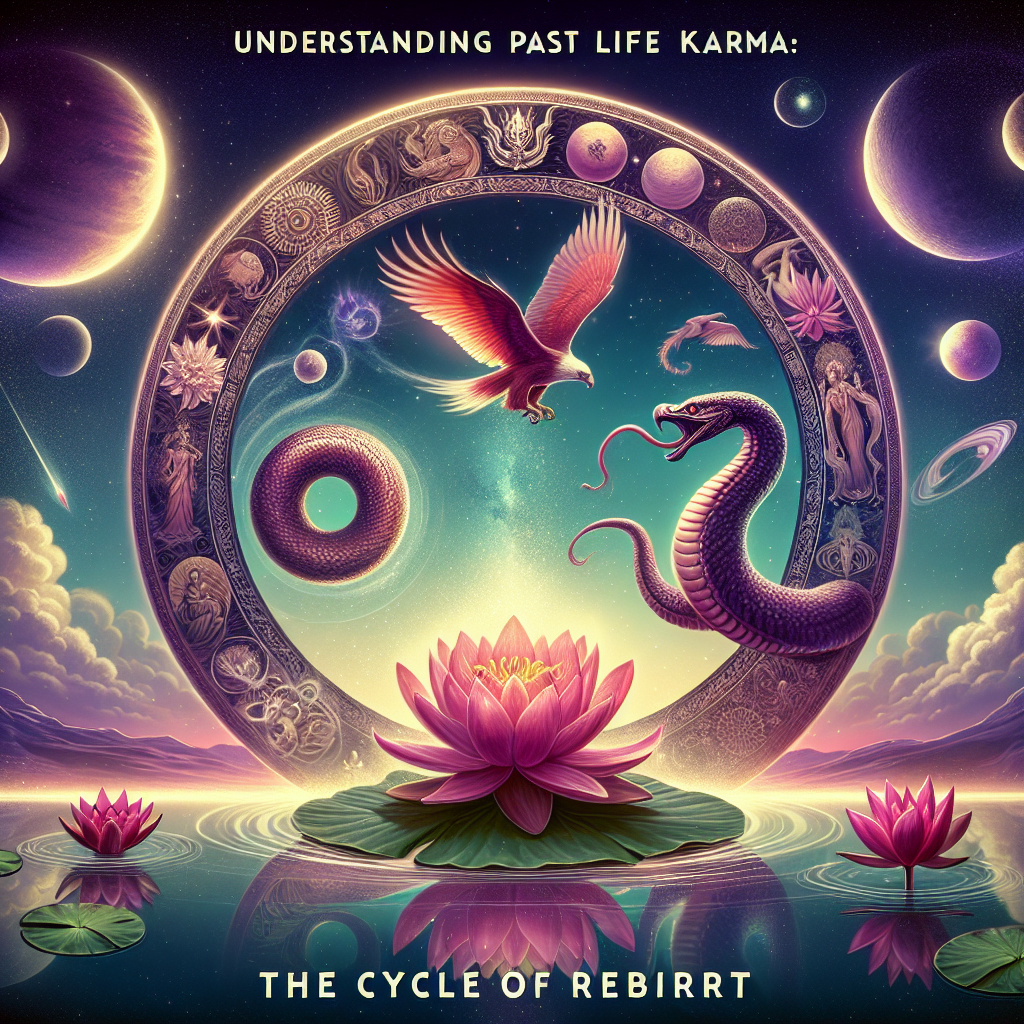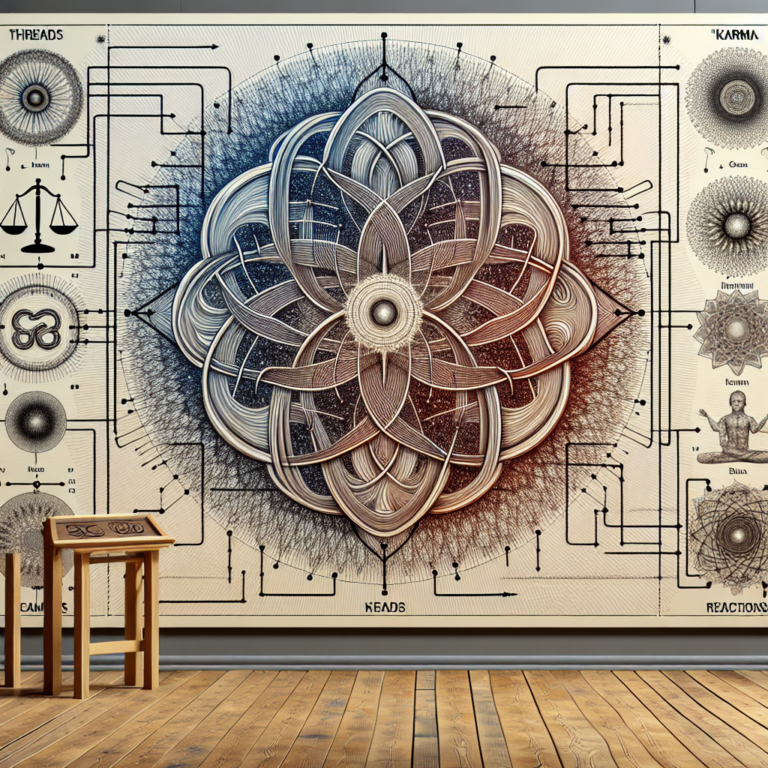The concept of karma and the cycle of rebirth is an intricate and fascinating topic that spans religions and philosophies worldwide. At its core, karma refers to the law of cause and effect, where every action has consequences that influence future experiences, both in this life and in lives beyond. In this article, we will delve deeply into the nuances of past life karma, examining how it shapes our lives, the cycle of rebirth, and its implications on our spiritual journeys.
1. What is Karma?
Karma is a term derived from the Sanskrit word “karman,” which means “action” or “deed.” It is a fundamental concept in several Eastern religions, particularly Hinduism and Buddhism. Although its interpretations and implications may vary across different cultures, the essence remains the same: our actions, whether good or bad, create a ripple effect that ultimately returns to us in some form.
1.1 The Law of Cause and Effect
The foundational principle of karma is that every cause has an effect. This is sometimes simplified to the phrase “what goes around comes around.” The actions we take impact not only ourselves but also the lives of others and the world around us. This interconnectedness highlights the importance of our choices, emphasizing that ethical living and compassion lead to positive outcomes.
1.2 Types of Karma
Karma can be understood in several forms:
- Sanchita Karma: This is the accumulated karma from all of our past lives. It includes all actions—both good and bad—that we have performed throughout our existence, and it influences our current life circumstances.
- Prarabdha Karma: This is the portion of sanchita karma that we are currently experiencing. It represents the karma that manifests in our present life and influences our thoughts, actions, and situations.
- Kriyamana Karma: Also known as “current karma,” this refers to the actions we are performing now. Kriyamana karma has the potential to become either sanchita or prarabdha karma in the future, depending on our current actions and intentions.
2. The Cycle of Rebirth
The cycle of rebirth, known as samsara, is a crucial aspect of understanding karma. It refers to the continuous cycle of birth, death, and rebirth that all beings undergo until they achieve liberation (moksha) from this cycle.
2.1 Spiritual Evolution and Learning
One of the primary reasons for reincarnation is spiritual evolution. Each incarnation presents an opportunity for the soul to learn and grow from previous actions and experiences. The lessons learned in each life contribute to the soul’s understanding, wisdom, and compassion, allowing it to evolve toward ultimate enlightenment.
2.2 The Role of Dharma
Dharma, often translated as “duty” or “righteousness,” plays a significant role in the cycle of rebirth. It refers to the moral and ethical obligations that individuals must fulfill in accordance with their role in life, including family, society, and the greater good. Fulfilling one’s dharma positively impacts one’s karma, leading to better circumstances in future lives.
3. Past Life Karma
Understanding past life karma is essential for comprehending how our past actions influence our present circumstances and future experiences. Many believe that the struggles and challenges we face in life may stem from unresolved issues, patterns, and lessons from previous incarnations.
3.1 Unresolved Issues
Our past lives may involve unresolved issues or traumas that continue to affect our current life. These may manifest as fears, phobias, relationships challenges, or health issues, often leading us to repeat negative patterns. By addressing these unresolved issues and learning from past mistakes, individuals can mitigate the effects of negative karma flowing from their past choices.
3.2 Past Life Regression
Past life regression is a therapeutic technique that allows individuals to access memories from previous lives. By exploring these memories, individuals can gain insights into their current lives, address unresolved issues, and make peace with their past actions. This process typically involves guided visualization techniques facilitated by trained therapists or practitioners.
4. The Impact of Past Life Karma on Relationships
Relationships often provide valuable insights into past life karma. The dynamics we experience in our current relationships may be influenced by our interactions and connections with others in past lives.
4.1 Soulmates and Karmic Relationships
Some relationships are considered “karmic” as they may involve unresolved lessons or debts from previous lives. Karmic relationships can often feel intense and challenging, prompting individuals to confront deep-seated issues. Alternatively, soulmates, or individuals with whom we share a strong spiritual connection, inspire mutual growth and learning across lifetimes.
4.2 Healing Through Relationships
Through our relationships, we have the opportunity to heal past-life wounds and patterns. It is crucial to approach these relationships with awareness and compassion, understanding that certain interpersonal dynamics may arise from past life issues seeking resolution. By consciously addressing these patterns, individuals can cultivate healthier relationships and break free from karmic cycles.
5. Breaking the Cycle of Karma
The ultimate goal for many spiritual seekers is to break free from the cycle of samsara, thus alleviating the burden of past life karma. Achieving this requires a dedicated spiritual practice focused on self-awareness and growth.
5.1 Mindfulness and Self-Awareness
Practicing mindfulness and self-awareness allows individuals to observe their thoughts, emotions, and actions without judgment. By cultivating greater awareness, individuals can identify harmful patterns and consciously choose to act in ways that positively influence their karma.
5.2 Cultivating Compassion
Acts of kindness and compassion are paramount in transforming negative karma into positive karma. By fostering empathy, understanding, and love towards ourselves and others, we promote healing and growth, paving the way for liberation from the cycle of rebirth.
6. The Role of Forgiveness
Forgiveness is a powerful tool for healing past life karma. Holding onto anger, resentment, or guilt can bind individuals to negative karmic cycles. When we forgive ourselves and others, we free ourselves from the weight of unfinished business, allowing for positive transformation.
6.1 Self-Forgiveness
Self-forgiveness is a crucial component of healing. Individuals must learn to let go of past regrets and acknowledge that they are continuously evolving. Embracing self-compassion enables personal growth and the release of negative karma associated with self-condemnation.
6.2 Forgiveness of Others
Extending forgiveness towards others is equally important. By releasing grudges and negative emotions, individuals can break karmic ties that may be holding them back. This act significantly contributes to healing and may lead to new beginnings in various aspects of life.
Conclusion
Understanding past life karma and the cycle of rebirth is essential in navigating our spiritual journeys. By recognizing the impact of our actions on ourselves and others, we can strive to cultivate positive karma and learn valuable lessons that contribute to our growth.
The transformative process involves mindfulness, compassion, forgiveness, and the courage to confront unresolved issues from our past lives. As we take conscious steps towards healing and growth, we empower ourselves to break free from the cycles that bind us, ultimately leading us toward liberation from the repetitive cycles of samsara.
Each life is an opportunity for growth, learning, and metamorphosis. By embracing the lessons of past lives and applying them to our current experiences, we can craft a more meaningful existence—one marked by conscious choices, purposeful living, and profound compassion.
FAQs
What is the difference between karma and past life karma?
Karma refers to the law of cause and effect, where every action creates consequences that influence our current and future experiences. Past life karma specifically pertains to the actions and experiences from previous lives that continue to impact us in our current life.
Can past life karma affect my relationships?
Yes, past life karma can significantly influence your current relationships. Unresolved issues from previous lives may manifest in how you interact with others, while karmic relationships may present challenges or opportunities for learning and growth.
How can I heal my past life karma?
You can heal past life karma through mindfulness, self-reflection, forgiveness, and by consciously addressing unresolved issues. Practices such as meditation, past life regression therapy, and compassion-based actions can facilitate healing.
Is it possible to remember past lives?
Some individuals claim to have memories of past lives, often facilitated through techniques like hypnosis or deep meditation. Such memories can provide insights into current life challenges and patterns but should be approached with caution and openness.
What role does intent play in karma?
Intent plays a vital role in karma. The motivations behind our actions can influence the karma we create. Positive intentions lead to positive outcomes, while negative intentions can generate harmful karma.
It seems like you might want to provide a specific prompt or topic for discussion. How can I assist you today? If you have a particular subject, question, or theme in mind, please share it!, #Understanding #Life #Karma #Cycle #Rebirth, #Understanding #Life #Karma #Cycle #Rebirth, 1736470938, understanding-past-life-karma-the-cycle-of-rebirth





